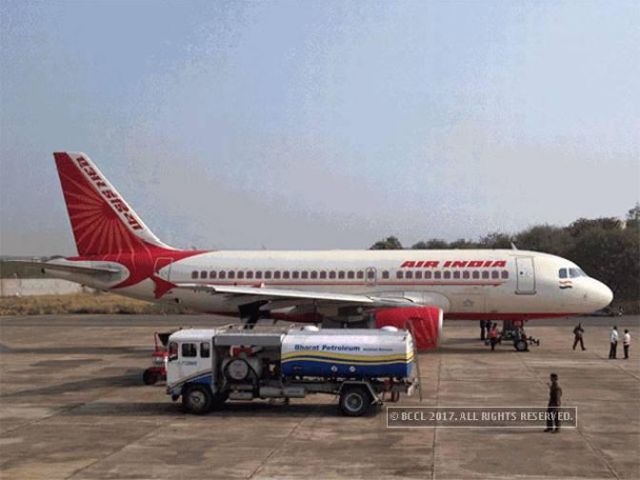
by admin | May 25, 2021 | Muslim World

MANAMA: An air bubble agreement has been finalised by Bahrain and India to facilitate travel between the two countries, the Indian Embassy in Bahrain has announced.
As per the arrangement, both Indian and Bahraini national carriers will be permitted to operate specified number of flights between India and Bahrain, the embassy said in a statement.
The designated airlines for the purpose are: Gulf Air, Air India and Air India Express.
The following categories of persons will be allowed on such flights:
From Indian to Bahrain
Bahraini nationals/ residents
Any Indian national holding any type of valid Bahraini visa and destined for Bahrain only. It would be for the airlines concerned to ensure that there is no travel restriction for Indian nationals to enter Bahrain with the particular visa category before issue of ticket/boarding pass to the Indian passenger.
From Bahrain to India
Indian nationals stranded in Bahrain
All Overseas Citizen of India (OCI) cardholders holding Bahraini passports, and
Bahraini nationals holding valid visa issued by an Indian mission.
The designated airlines of both sides will be permitted to sell tickets between Indian and Bahrain in each direction through their websites, sales agents and Global Distribution Systems.
Passengers can contact the specified airlines for tickets, the statement said.
-TradeArabia News Service
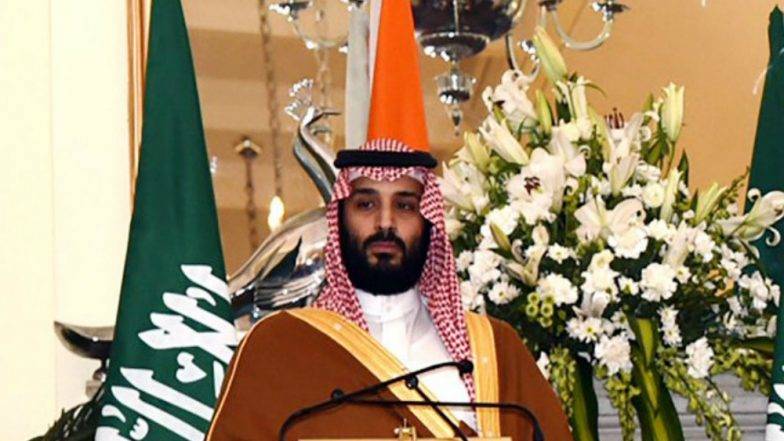
by admin | May 25, 2021 | Business, Opinions
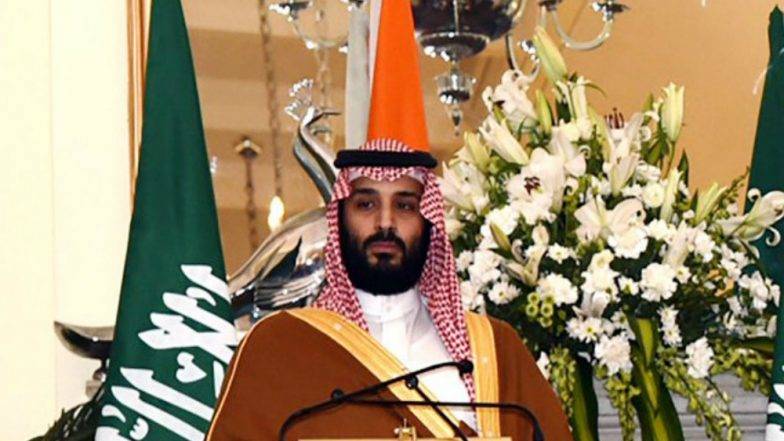
By Dr. Cauvery Ganapathy
Indias relations with Saudi Arabia since 2006 is an example of a dynamic that has enmeshed diversified strategic orientations successfully. While strengthening historical sinews, New Delhis ties with Riyadh over the years, has been unaffected by Indias strident forays into new partnerships in West Asia.
Simultaneously, the relation has also evolved over time into a diversified portfolio that subsumes a far wider range of issues than energy and diaspora issues alone. Home to a 2.7 million strong Indian diaspora, as India’s fourth largest trading partner and consistent as one among its three largest suppliers of oil , Saudi Arabia’s relevance to the Indian economy is indisputable.
This is, however, an old tale. What Crown Prince Mohammed bin Salman’s visit, it was hoped, would consolidate was a more recent role as a strategic partner. Much in the visit touched upon that hope. In addition to the creation of a Strategic Partnership Council, Memorandums to facilitate cooperation between the two sides were signed on a diverse range of concerns such as-
– The National Investment and Infrastructure Fund
– Tourism
– Housing
– Closer coordination through bilateral investment forums, and
– Broadcasting
Proclamations from MBS – as the Crown Prince is popularly known – alluding to an investment of nearly $200 billion in India over the next two years was also seen as a significant indication of Riyadh’s keenness in cultivating ties with New Delhi. Coupled with the general bonhomie and optimism that persisted, MBS’ visit does qualify as a successful bilateral meet.
However, it may be worthwhile to consider if the intrinsic value of the partnership could not, in fact, have been leveraged a bit more through themes such as:
Price Stabilisation -This would insulate India from the obvious and expected volatility of the energy markets. India offers an assured market for the mainstay of Saudi Arabia’s export basket and an agreement that would ensure price stabilisation for the commodity could, therefore, prove profitable to both the parties.
Abolition of the Asian Premium – The substantial volume of crude oil purchased by India translates into an import bill that is inflated. Removal of such a ‘premium’ would aid in reducing India’s import bill.
Allowing India a buy-in as a ‘cornerstone investor’ into ARAMCO, if and when it is launched, would signal a long-term commitment on part of both the States to strengthening of ties.
Enhanced defence cooperation between the two countries would not only prove beneficial but given regional realities, it would perhaps, prove more effective and binding to forge an institutional mechanism that could propel such a partnership forward.
Finally, there are two factors that New Delhi would perhaps do well to consider in cultivating the relations with the Saudis further-
– To express chagrin and seek to publicly push others to choose India over another country, however justified our own outrage, is not perhaps a very fruitful expression of diplomacy or international politics. It would bode us better to strengthen the invested stake of a country like Saudi Arabia in our own welfare by making the economic and strategic ties too robust to override in times of localized or international conflict; and an integration of economic and security interests does this better than well-meaning but hyperbolic expressions of expectations in the media.
– Indian energy diplomacy has long been plagued by a belated undertaking of due diligence back home before the concluding of agreements with foreign countries. The fact that the massive Saudi investment in Ratnagiri, Maharashtra is now caught in the crosshairs of local politics and land acquisition issues, is just one more example of this tendency. It is true that countries are always appreciative of and seek out lucrative and large markets such as India. That does not, however, imply that sovereign wealth-fund owners such as Saudi Arabia would carry an unending reservoir of patience regarding commitments coming to fruition.
(IANS)
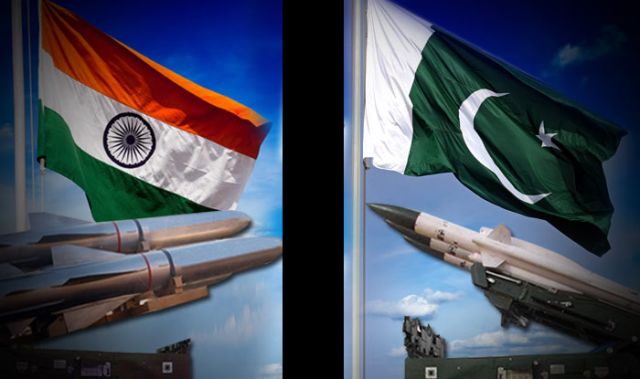
by admin | May 25, 2021 | News
 New Delhi : India and Pakistan on Tuesday exchanged their lists of nuclear installations, according to an agreement signed in 1988.
New Delhi : India and Pakistan on Tuesday exchanged their lists of nuclear installations, according to an agreement signed in 1988.
“India and Pakistan today exchanged, through diplomatic channels simultaneously at New Delhi and Islamabad, the list of nuclear installations and facilities covered under the Agreement on the Prohibition of Attack Against Nuclear Installations between India and Pakistan,” the External Affairs Ministry said in a statement.
“The agreement, which was signed on December 31, 1988, and entered into force on January 27, 1991, provides, inter alia, that the two countries inform each other of nuclear installations and facilities to be covered under the agreement on the first of January of every calendar year,” it stated.
This is the 28th consecutive exchange of such lists between the two South Asian nuclear powers, the first one having been done on January 1, 1992.
—IANS
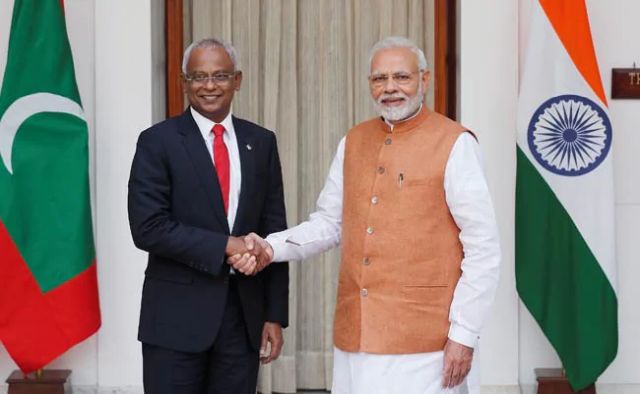
by admin | May 25, 2021 | Corporate, Corporate Governance, News
 New Delhi : India and the Maldives on Monday agreed to deepen cooperation to maintain peace and security in the Indian Ocean region as New Delhi extended lines of credit worth $1.4 billion to the archipelago nation following delegation-level talks between Prime Minister Narendra Modi and Maldives President Ibrahim Mohamed Solih here.
New Delhi : India and the Maldives on Monday agreed to deepen cooperation to maintain peace and security in the Indian Ocean region as New Delhi extended lines of credit worth $1.4 billion to the archipelago nation following delegation-level talks between Prime Minister Narendra Modi and Maldives President Ibrahim Mohamed Solih here.
The two sides also signed four agreements, including on cultural cooperation, IT and electronics cooperation and on improving the ecosystem for agribusiness.
“President Solih and I agree that to maintain peace and security in the Indian Ocean region, we need to deepen our cooperation,” Modi said while jointly addressing the media with Solih after the talks.
“Both India and the Maldives share equal interest and stake in the development and stability of our region,” he said.
Stating that the security interests of the two countries are related to each other, Modi said that there is also unanimity on the sustainability of this region and to be conscious of each other’s interests and concerns.
“We will not allow the use of our countries to harm each other,” he said.
“I want to work together with President Solih for the bright future of our region, and utilise all possibilities in the relationship between India and Maldives.”
According to a joint statement issued following the talks, both leaders agreed to strengthen cooperation to enhance maritime security in the Indian Ocean region through coordinated patrolling and aerial surveillance, exchange of information and capacity building.
“The two leaders reaffirmed their unwavering commitment and support for increased cooperation in combating terrorism in all its forms and manifestations both within the region and elsewhere,” it stated.
“Both sides agreed to enhance bilateral cooperation on issues of common concern, including piracy, terrorism, organised crime, drugs and human trafficking.”
The Prime Minister hailed Maldives’ decision to re-join the Commonwealth and welcomed the country as the newest member of the Indian Ocean Rim Association.
In his address, Modi also said that India is proud that the Maldives has become a medium income country from being a least developed country.
“The Maldives achieved this despite facing the challenges of sustainable development and climate change,” he said.
“In resolving these challenges, and in the sustainable development of marine resources, the role of Maldives will be important throughout the world.
“Therefore, we agreed to increase mutual cooperation on the various aspects of maritime cooperation between India and the Maldives.”
The Prime Minister said that India will always with be the Solih government in its efforts to carry out ambitious plans for changing the lives of the people of Maldives, and to give a human face to development in the country.
“I am glad that as a direct expression of this commitment, for the socio-economic development of the Maldives, India will extend budget support, currency swap and concessional lines of credit worth $ 1.4 billion,” he said.
Modi also called for boosting connectivity between India and the Maldives saying that better connectivity will lead to exchange of goods and services, information, ideas, culture and people.
He assured Solih of strengthening the two nations’ partnership in health, human resource development, infrastructure, agriculture, capacity building, ICT and tourism.
In this connection, Modi offered additonal 1,000 seats in India for Maldivian nationals for training and capacity building.
The Prime Minister also called for boosting commercial relations and bilateral trade.
“I welcome the growing opportunities for investment by Indian companies in the Maldives,” he said.
According to the joint statement, both leaders agreed to promote closer economic cooperation in sectors such as fisheries development, tourism, transportation, connectivity, health, education, information technology, new and renewable energy and communications.
On his part, Solih said that during the discussions, both sides reaffirmed their commitment to democracy.
“We agreed on the mutual need for regional stability and security in the Indian Ocean,” he said.
According to the statement, Solih reaffirmed his government’s India-First Policy, and commitment to working together closely with India.
“He appreciated the generous assistance provided by the government of India to Maldives, and identified various areas for developmental cooperation, including private sector involvement in development of housing and infrastructure, water and sewerage systems in the outlying islands, healthcare, education and tourism,” it stated.
In his address, Solih said that he has invited both President Ram Nath Kovind and Modi to visit the Maldives next year
Earlier in the day, Solih was accorded a ceremonial welcome at the Rashtrapati Bhavan during which Modi greeted him with a hug.
External Affairs Minister Suhma Swaraj also called on the visiting dignitary and discussed all aspects of the bilateral ties.
Solih arrived here on Sunday on a three-day visit to India, his first foreign visit since assuming office on November 17.
Relations between India and the Maldives deteriorated after Solih’s predecessor Abdulla Yameen imposed an internal emergency in February this year. Yameen was also seen as leaning towards China sidelining India.
Solih defeated Yameen in the elections in September to take over as President.
—IANS
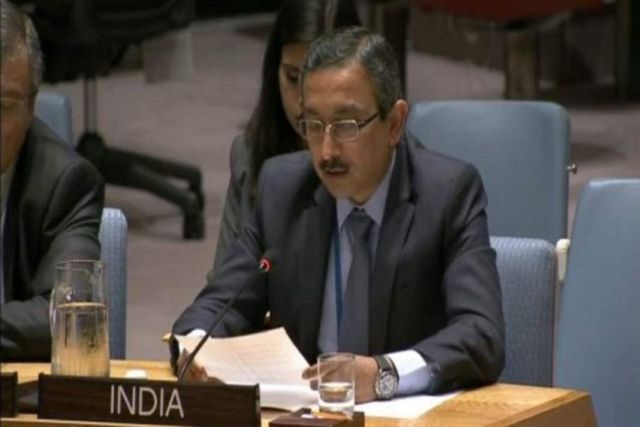
by admin | May 25, 2021 | News

Tanmaya Lal
By Arul Louis,
United Nations : Facing the prospects of US sanctions over its deals with Russia and Iran, India has used the annual General Assembly debate on Washington’s economic blockade of Cuba to lash out against unilateral embargoes.
“As the world’s largest democracy with abiding faith in multi-lateralism, India stands in solidarity with this Assembly in its unambiguous rejection of domestic laws having extraterritorial impact,” Tanmaya Lal, India’s Deputy Permanent Representative, said on Wednesday.
Year after year, the General Assembly has voted for lifting the sanctions on Cuba and last year 191 of the 193 UN members backed the resolution with only the US and Israel opposing it.
India has always opposed the Cuban sanctions.
“Every year this Assembly has rejected the imposition of laws and regulations with extra-territorial impact and all other forms of coercive economic measures that hurt the progress and prosperity of the people the world over,” Lal said.
The Cuban sanctions do not directly affect countries like India that trade with Havana.
Although the US embargo mostly restricts engagement by American companies and individuals with the Caribbean country, it does have spillover effects on companies from other countries.
India and most countries oppose the Cuban embargo on principle and maintain that domestic laws should not have extra-territorial effect on other countries.
Only the Security Council can impose international sanctions under the UN Charter as it has done, for example with North Korea.
The General Assembly has called on countries “to refrain from promulgating and applying and to repeal and invalidate laws and measures that have extra-territorial effects affecting the sovereignty of other States, in conformity with their obligations under the UN Charter and international law”, Lal said.
The US has warned India it could face sanctions under its domestic law, the Countering America’s Adversaries Through Sanctions Act (CAATSA), for a deal to buy an advanced air defence missile system, the S400, at an estimated cost of about $5 billion from Russia and other defence purchases.
Mainly motivated by alleged Russian interference in the 2016 presidential elections, the US Congress enacted CAATSA that President Donald Trump signed into law.
While that law also has some impact on Iran, Trump has separately acted to impose more stringent sanctions on countries trading with Tehran after reneging the agreement signed by the five permanent members of the UN Security Council and Germany and the European Union with Iran to end its quest for nuclear weapons.
The Iran sanctions that come into force on November 4 that could hit India, which buys oil from Tehran and has several projects there like the Chabahar port development.
Trump could exempt India from the sanctions, but has not said so far if he would.
Scores of countries that spoke during the debate attacked the sanctions on Cuba and demanded that they be lifted.
Representatives of the Non-Aligned Movement and the Group of 77, as well as regional groups like those representing Latin America, the Caribbean and Southeast Asia called for lifting of the sanctions.
(Arul Louis can be reached at arul.l@ians.in and followed on Twitter @arulouis)
—IANS






